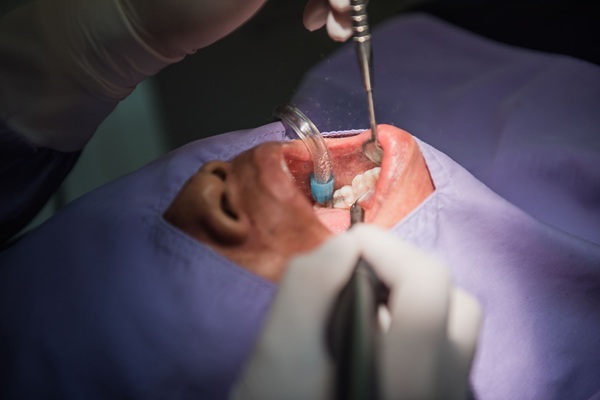 Dental implants are durable, natural-looking replacements for missing teeth. An implant dentist may recommend a single implant or multiple implants spaced throughout the mouth depending on how many teeth are missing and where. This blog will discuss when single or multiple implants are recommended, as well as the other tooth replacement options that can bolster implants.
Dental implants are durable, natural-looking replacements for missing teeth. An implant dentist may recommend a single implant or multiple implants spaced throughout the mouth depending on how many teeth are missing and where. This blog will discuss when single or multiple implants are recommended, as well as the other tooth replacement options that can bolster implants.
How dental implants work
Dental implants are biocompatible posts surgically installed in the jaw to replace teeth. First, the posts fuse with the jawbone in a process called osseointegration, which can take several months. Then the implant dentist will schedule an additional appointment to place abutments to join each implant to a dental crown, a porcelain or composite resin cap that looks and functions like a real tooth. Essentially, the implant is the new tooth root, while the crown acts as the new tooth.
Due to the installation process, implants are highly durable and known to last a long time (a lifetime if properly cared for). They are a popular alternative to dentures because patients do not have to worry about them slipping. Eating, talking, and smiling with implants will feel like natural teeth. Patients cannot remove them without the help of an implant dentist, so there is no need to soak them in water or solution overnight, like with dentures.
Single implants
An implant dentist will likely recommend a single dental implant to replace one missing tooth. This is a simple way to replace one tooth without interfering with the adjacent teeth. In addition, a single implant tends to heal easily, as the surrounding healthy bone can promote quick osseointegration.
Similarly, the dentist will recommend two single implants instead of a dental bridge if two adjacent teeth are missing. Dental bridges are another popular tooth replacement solution in which remaining teeth, crowns, or implants support artificial teeth. Bridges require a dentist to shave down the supporting teeth. However, this is not required with dental implants, making them a better option to replace a couple of missing teeth surrounded by otherwise healthy teeth.
Multiple implants
An implant dentist may recommend multiple dental implants or an implant-supported bridge if a patient is missing three or more teeth. This allows for easier healing, as only a couple of implants need to be installed to support a bridge of three or more dental crowns. The remaining healthy teeth will not need to be ground down, either.
If all the teeth are missing or failing, the dentist may recommend a fixed denture, or full-arch prosthesis, supported by four to six implants. Replacing every single tooth with its own implant is typically not recommended, as it can become costly and lengthen the recovery time. On the other hand, a full-arch prosthesis enables a patient to replace their natural teeth more cost-effectively. It also requires less healing, as only four to six implants will need to fuse with the jawbone (about eight to 12 implants total, as opposed to 32 to replace all the teeth).
Other factors to consider
The first step of getting dental implants is to undergo a consultation and examination with an implant dentist. In addition to the number of teeth missing or failing, the dentist will also consider the following to determine if and how many implants would be right for the patient:
- Budget
- Lifestyle
- Known allergies
- Medical history
- Oral health and hygiene habits
- Preexisting conditions, such as diabetes
The only way to determine if a patient is an ideal candidate for implants is to schedule a consultation, where they will undergo a physical examination and additional testing, such as X-rays or MRIs.
Request more information
Are you considering dental implants? Whether you are looking to replace one, several, or all of your teeth, an implant dentist can help you explore the options available. Call today to get started.
Request an appointment or call Carolina Smiles Family Dental at 828-884-3702 for an appointment in our Brevard office.
Recent Posts
If you are missing one or more teeth, visiting an implant dentist is a good first step toward restoring your smile. Dental implants are an exciting, new, and versatile way to replace teeth and get people back to smiling confidently and enjoying the foods they love. However, dental implants may not be for everyone. Therefore,…
An implant dentist can provide a natural-looking and durable alternative to traditional tooth-replacement methods with dental implant restorations. This article covers some of the common tooth restoration options available from an implant dentist.An implant restoration usually consists of three parts: the implant, the abutment, and the dental crown. The implant is surgically inserted into the…
Patients looking to replace missing or failing teeth may benefit from dental implants, a long-lasting dental restoration that mimics the function and form of real teeth. Depending on the patient's oral health, implant dentists use two types of implants: endosteal and subperiosteal. In this blog, we will closely examine the different types of implants and…


